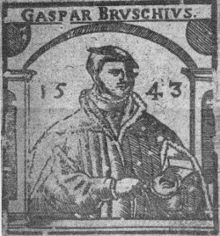Kaspar Brusch
Kaspar Brusch also: biter , Latinized Caspar Bruschius (* 19th August 1518 in Schlaggenwald ; † 20th November 1559 between Rothenburg and Windheim ) was a German humanist , imperial Hofpfalzgraf and the poet Crown -winning poet and historian.
Life
Brusch was the son of the shoemaker, bookseller and textile and leather goods dealer Hans Bruschen (* around 1488 in Eger, † 1568 in Pettendorf in the Upper Palatinate ) and his first wife Barbara Kurtzel, who died early, was widowed Törffler. From the age of one he spent his childhood with his relatives Peisser (Beisser), called Brusch (en), in the town of Eger in western Bohemia , attended the Latin school there and later switched to the Protestant Latin school in Hof . In 1536 he studied briefly at the University of Tübingen and in that year married Kunigunde Stumpf in Ulm on the Danube († after 1558 in Pettendorf). The Bruschius couple lived in Ulm with the widow of the evangelical theologian and reformer of the city of Ulm, Konrad Sam , and presumably had a son.
In 1541, Kaspar Bruschius was crowned with the poet's crown by Emperor Karl V von Habsburg at the Reichstag in Regensburg and he received a letter of arms confirming the inherited coat of arms. In 1542 he continued his studies at the University of Wittenberg with Philipp Melanchthon and was appointed imperial court palatinate and notary with far-reaching powers. Between 1546 and 1547 he was the rectorate at the Latin school in Lindau . In 1550 during the Reichstag in Augsburg, Kaspar Bruschius crowned the young David Peifer (* 1530, † 1602), later Chancellor of Electoral Saxony, with the crown of poets.
Similar to Conrad Celtis , Bruschius went on study trips to monastery and city archives. He published his research results in numerous books, about 80 in number, essays and pamphlets, and was admired during his lifetime, but also reviled and scorned, depending on the political-religious attitude of the observer of his work. He is the author of the first history of churches and monasteries in Germany. His contacts with representatives of the Roman Catholic Church, who sponsored his research and pressure, and whom he thanked with dedications and poems, earned him the unfounded accusation of lack of character. This was especially true in 1552/53 for his connections to the prince-bishop of the diocese of Passau , Wolfgang von Salm .
In 1555 he took over the Evangelical Lutheran parish as pastor in Pettendorf in the Upper Palatinate. His wife Kunigunde Brusch, née Stumpf, and his father Hans Brusch lived with him in the parsonage there. A brief research trip to the archives of the city of Rothenburg ob der Tauber led him into an ambush on his return trip. He was shot from his horse near Hartershofen in what was then the Schlingenbach forest, left lying there, not robbed, but the written records had disappeared. There is a presumption that he uncovered unlawful property claims and had to pay for it with his life. He was buried in the local parish church in Steinach an der Ens . A stone cross has been preserved over the centuries at the place of his death.
His historical-geographical descriptions of landscapes, including the Fichtel Mountains (Ulm 1539), travels in Bavaria (Basel 1553) and his cityscapes, etc. a. About Linz , Regensburg , Eger ( Cheb ), Schlaggenwald and Wunsiedel are sources of landscape science and are noted in city anniversaries and city history publications.
Kaspar Brusch (ius) was the cousin of the Eger bookseller Balthasar Brusch and great-great-uncle of the Syndicus of the city of Eger, Johann Brusch von Neiberg .
Works
- Magnum opus de omnibus Germaniae episcopatibus , Nuremberg 1549 ( digitized version )
- Monasteriorum Germaniae praecipuorum ac maxime illustrium centuria prima , Ingolstadt 1551 Google Books , published again in 1682 as Chronologia monasteriorum Germaniae praecipuorum ( digitized version , supplement )
- Odoiporikon , Regensburg 1554 ( digitized version )
literature
- Adalbert Heinrich Horawitz : Brusch, Kaspar . In: Allgemeine Deutsche Biographie (ADB). Volume 3, Duncker & Humblot, Leipzig 1876, pp. 453-455.
- Richard Newald: Brusch, Kaspar. In: New German Biography (NDB). Volume 2, Duncker & Humblot, Berlin 1955, ISBN 3-428-00183-4 , p. 690 ( digitized version ).
- German Gender Book (56th General Volume, Volume 207, 1998, lineage Brusch, Bruscha, Bruschius, Brusch von Neiberg and Brusch Edle von Bruschen from Eger in Bohemia, formerly Peisser from Ingolstadt in Bavaria, with a representation of the coat of arms, pp. 2–53 ; For generation number Va 1. the humanist Kaspar Bruschius (Brusch), pp. 15-17; CA Starke Verlag , Limburg an der Lahn, 1998.)
- Walther Ludwig: Gaspar Bruschius as a historiographer of German monasteries and his reception . Göttingen 2002
- Adalbert Horawitz : Caspar Bruschius - A contribution to the history of humanism and the Reformation, published by the Association for the History of Germans in Bohemia , there pages 195 to 197 at the end of his life the section: Brusch's exit. Self-published by the association and commissioned by FABrockhaus in Leipzig, Prague-Vienna, 1874.
- Rudolf Wolkan : Bohemia's share in the German literature of the XVI. Century. KuK Hofbuchdruckerei A. Haase, Prague, 1894, part 3, p. 142
Web links
Individual evidence
- ^ Werner Dobras: Lindau personalities . In: Museumsverein Lindau e. V. (Ed.): New Year's Gazette 26 of the Lindau Museum Association . 1981.
| personal data | |
|---|---|
| SURNAME | Brusch, Kaspar |
| ALTERNATIVE NAMES | Bruschius, Kaspar; Beisser, Kaspar |
| BRIEF DESCRIPTION | Humanist, Evangelical Lutheran theologian, Count Palatine, crowned poet |
| DATE OF BIRTH | August 19, 1518 |
| PLACE OF BIRTH | Schlaggenwald |
| DATE OF DEATH | November 20, 1559 |
| Place of death | between Rothenburg and Windsheim |
